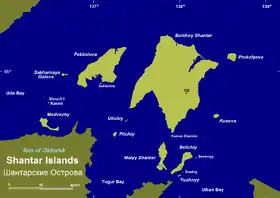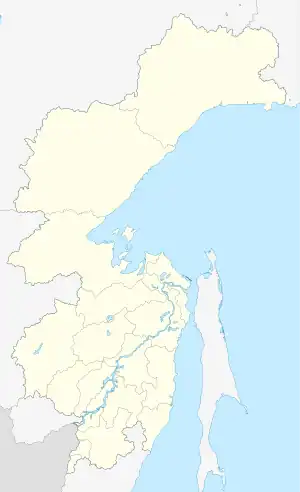Bolshoy Shantar Island
Bolshoy Shantar (Russian: Большо́й Шантар, tr. Greater Shantar, IPA: [bɐlʲˈʂoj ʂɐnˈtar]) is the main island of the Shantar Islands in the Sea of Okhotsk, Russia; its area is 1,766 square kilometres (682 square miles) and it measures about 72 by 49 km (44+1⁄2 by 30+1⁄2 mi). It has a large brackish lake (Lake Bol'shoe, "Big Lake") on its north side which is connected to the sea through a narrow passage. Yakshin Bay indents the southwest side of the island.
 The Shantar Islands in the Sea of Okhotsk | |
 Bolshoy Shantar Bolshoy Shantar Island (Russia) | |
| Geography | |
|---|---|
| Location | Sea of Okhotsk |
| Coordinates | 54°56′N 137°30′E |
| Archipelago | Shantar Islands |
| Area | 1,766 km2 (682 sq mi) |
| Length | 72 km (44.7 mi) |
| Width | 49 km (30.4 mi) |
| Administration | |
| Federal Subject | Khabarovsk Krai |
Administratively this island belongs to the Khabarovsk Krai of the Russian Federation.
History
The Shantar Islands were explored by Russian surveyors between 1711 and 1725.[1]
Bolshoy Shantar was frequented by American whaleships between 1852 and 1907. They hunted bowhead whales, particularly in the passages that separate Bolshoy Shantar from Feklistova and Prokofyeva. They also went ashore to obtain wood and water and hunt bears and foxes.[2][3] Two whaleships were wrecked on the island. On 18 October 1858, the bark Rajah (250 tons), of New Bedford, was wrecked on the north side of the island during a strong gale. Captain Ansel N. Stewart, the first officer, and 11 other men perished; the second mate and the twelve other crew members were saved four days later by the ship Condor (349 tons), of New Bedford, Captain Samuel H. Whiteside. Five men, including the captain, were buried on the island.[4][5] Items from the wreck were found on the island as late as 1865.[6] On 30 August 1907, the schooner Carrie and Annie (90 tons), of San Francisco, was wrecked on the island during a gale. The crew remained stranded on Bolshoy Shantar until 11 September, when the Russian transport Nitzun rescued them.[7][8]
Climate
| Climate data for Bolshoy Shantar Island (1991–2020 normals, extremes 1924–present) | |||||||||||||
|---|---|---|---|---|---|---|---|---|---|---|---|---|---|
| Month | Jan | Feb | Mar | Apr | May | Jun | Jul | Aug | Sep | Oct | Nov | Dec | Year |
| Record high °C (°F) | −0.1 (31.8) |
−0.8 (30.6) |
10.2 (50.4) |
15.1 (59.2) |
27.3 (81.1) |
28.6 (83.5) |
31.9 (89.4) |
28.5 (83.3) |
25.4 (77.7) |
18.5 (65.3) |
8.0 (46.4) |
1.8 (35.2) |
31.9 (89.4) |
| Average high °C (°F) | −14.0 (6.8) |
−12.6 (9.3) |
−5.9 (21.4) |
1.4 (34.5) |
7.5 (45.5) |
13.7 (56.7) |
17.2 (63.0) |
18.2 (64.8) |
14.5 (58.1) |
5.9 (42.6) |
−5.3 (22.5) |
−12.9 (8.8) |
2.3 (36.2) |
| Daily mean °C (°F) | −19.3 (−2.7) |
−19.0 (−2.2) |
−12.6 (9.3) |
−3.8 (25.2) |
2.3 (36.1) |
7.2 (45.0) |
11.6 (52.9) |
12.8 (55.0) |
9.0 (48.2) |
1.6 (34.9) |
−8.5 (16.7) |
−17.0 (1.4) |
−3.0 (26.6) |
| Average low °C (°F) | −25.3 (−13.5) |
−25.8 (−14.4) |
−19.8 (−3.6) |
−9.1 (15.6) |
−1.5 (29.3) |
2.4 (36.3) |
7.1 (44.8) |
8.0 (46.4) |
3.4 (38.1) |
−3.0 (26.6) |
−12.6 (9.3) |
−22.1 (−7.8) |
−8.2 (17.3) |
| Record low °C (°F) | −43.5 (−46.3) |
−42.1 (−43.8) |
−38.6 (−37.5) |
−30.2 (−22.4) |
−15.3 (4.5) |
−6.8 (19.8) |
−3.6 (25.5) |
−3.9 (25.0) |
−8.4 (16.9) |
−21.3 (−6.3) |
−34.5 (−30.1) |
−41.1 (−42.0) |
−43.5 (−46.3) |
| Average precipitation mm (inches) | 30 (1.2) |
15 (0.6) |
25 (1.0) |
32 (1.3) |
57 (2.2) |
47 (1.9) |
60 (2.4) |
72 (2.8) |
68 (2.7) |
79 (3.1) |
55 (2.2) |
36 (1.4) |
576 (22.8) |
| Average precipitation days | 9.2 | 6.7 | 6.9 | 8.6 | 9.9 | 9.0 | 9.7 | 11.1 | 11.1 | 11.0 | 13.9 | 11.1 | 118.2 |
| Mean monthly sunshine hours | 108 | 157 | 217 | 205 | 215 | 246 | 213 | 209 | 183 | 143 | 84 | 82 | 2,062 |
| Source 1: Погода и Климат[9] | |||||||||||||
| Source 2: climatebase.ru[10] | |||||||||||||
Flora and fauna
There are spruce forests on the island[11] and smelts (Hypomesus japonicus) and (H. olidus) are found in Lake Bol'shoe.[12] In the spring and summer Steller's sea eagle[13] and Aleutian tern nest on the island; long-billed murrelet also appear to breed here.[14]
Popular culture
This island is mentioned in the 2008 video game Grand Theft Auto IV as the location of the headquarters of a fictional peer-to-peer programme called Shitster (a spoof of Napster).
References
- From the History of the Great Russian Geographical Discoveries in the Arctic and Pacific Oceans in the Seventeenth and First Half of the Eighteenth Centuries. by A. V. Efimov
- Arctic, of Fairhaven, Aug. 1852. In Gelett, C. W. (1917). A life on the ocean: Autobiography of Captain Charles Wetherby Gelett. Honolulu, Hawaii: Hawaiian Gazette Co., Ltd.
- J. E. Donnell, of New Bedford, July 8-12, 1852, Martha's Vineyard Museum; Isabella, of New Bedford, July 8, 1854, Nicholson Whaling Collection (NWC); Mary Frazier, of New Bedford, Aug. 28, 1855, NWC; Java, of New Bedford, Sep. 17–19, 1866, Kendall Whaling Museum (KWM); Sea Breeze, of New Bedford, Sep. 17, 23, 1874, G. W. Blunt White Library.
- The Friend, Honolulu, December 4, 1858, Vol. XV, No. 12, p. 93.
- Starbuck, Alexander (1878). History of the American Whale Fishery from Its Earliest Inception to the year 1876. Castle. ISBN 1-55521-537-8.
- Onward, of New Bedford, August 1, 1865, north side of Big Shantar Island, GBWL.
- Pacific Commercial Advertiser (Vol. XLVI, No. 7864, October 22, 1907, Honolulu).
- Los Angeles Herald (Vol. 35, No. 20, Oct. 22, 1907).
- "平年値(年・月ごとの値) 主な要素". Погода и Климат. Retrieved 16 February 2022.
- "climatebase". climatebase.ru. Retrieved 16 February 2022.
- Taiga in the Shantarskiye Islands Archived 2011-07-23 at the Wayback Machine
- Lake Bol'shoe Archived 2016-03-03 at the Wayback Machine
- Nigge, K. "The Russian Realm of Steller's sea-eagles". National Geographic, Vol. 195, No. 3 (March 1999): 60-71.
- Kondratyev, A. Y., Litvinenko, N. M., Shibaev, Y. V., Vyatkin, P. S., & Kondratyeva, L. F. (2000). The breeding seabirds of the Russian Far East. Seabirds of the Russian Far East, 37-81.